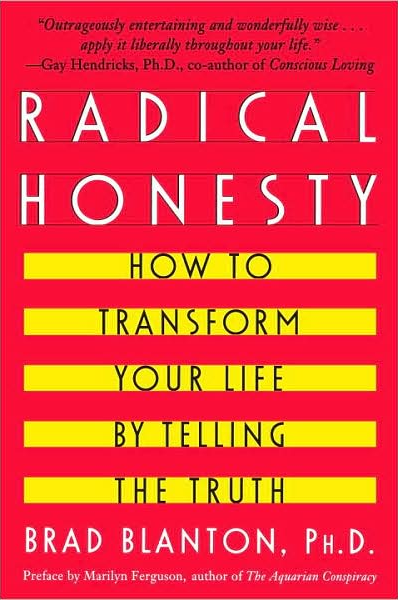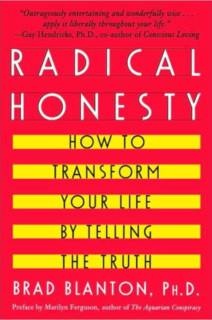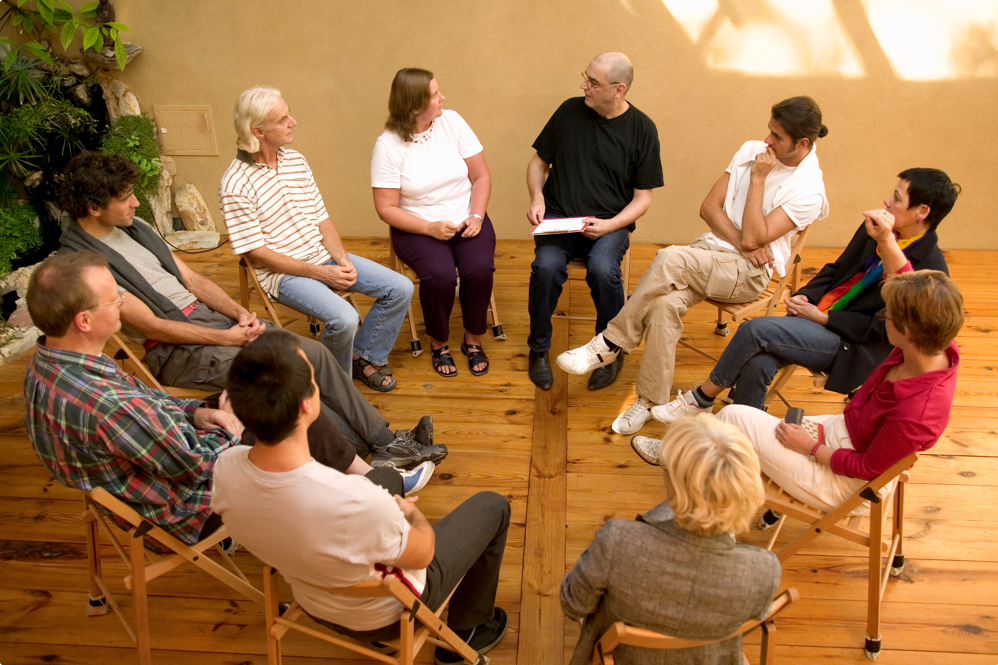Let’s Talk!
How honest are you? According to American psychotherapist Brad Blanton Ph.D., the controversial author of Radical Honesty (1996), most people lie daily about themselves and others. In the late 1990s Audrey Hope, the host of the program Reel Women interviewed Dr. Blanton. The following is a summary of that interview.
 Most people live in their minds, which is the major cause of depression, anxiety, and stress. The mind entertains unrealistic expectations of ourselves, others, and life which often leads to suffering. Most of us are brought up expecting life to unfold according to a socially acceptable script that rarely lives up to reality.
Most people live in their minds, which is the major cause of depression, anxiety, and stress. The mind entertains unrealistic expectations of ourselves, others, and life which often leads to suffering. Most of us are brought up expecting life to unfold according to a socially acceptable script that rarely lives up to reality.
We suffer from the cultural disease of moralism, which states that itâs more important to be right than to be alive. However, itâs wiser to uphold the opposite view: being alive is more important than having the appropriate beliefs. The fear of not measuring up leads many to spend their lives proving to others and themselves that they are intelligent, talented, and right.
Most parents and teachers believe that their role is to inculcate more values in children. But the real job of parents and teachers is to create an environment in which childrenâs spirits can flourish and allow them to learn according to their own interests.
Because of how we are raised, most people donât grow emotionally and spiritually beyond adolescence. A teen is primarily concerned about how they are perceived by others. The question of self-identity raised by this phase of development is usually left unanswered. The more industrialized a culture, the longer the adolescence, which can last up to the age of 40.
In his practice, Blanton observed that the majority of people had a difficult childhood and a life story in which they portrayed themselves as the heroes. This life story can be summed up in about 27 seconds:
âI was born an exceptionally talented individual to obtuse and ignorant parentsiiiiiiiiiiiiiiiiiiiiiiiiiiii who oppressed me and did damage as much as they could. But due to the sterling iiiiiiiiiiiiiiii character that I am, I turned out into the great person that you see right now.â
 Another major source of human stress are lies. By distorting the truth and hiding unflattering information about ourselves, we have an illusion of control over what others know about us. However, lying leads to an endless series of lies to cover the initial one, and this requires time, energy, and focus.
Another major source of human stress are lies. By distorting the truth and hiding unflattering information about ourselves, we have an illusion of control over what others know about us. However, lying leads to an endless series of lies to cover the initial one, and this requires time, energy, and focus.
Blanton is a firm believer in the healing effect of radical honesty. Honesty does not always equal truth since it is the truth of a personâs experience. He recommends that people tell the whole truth about their actions as well as how they feel and think; even if this hurts the feelings of others. Therefore in the process of radical truth-telling, one has to give up politeness.
An accumulation of bottled up negative feelings creates inner tension and disease in people. Society teaches us to suppress these emotions in order to prevent offending others, and we are usually praised for our restraint.
However, these unexpressed emotions are often redirected in other areas of life and create more problems. Blanton suggests that if a person did something that triggered a negative emotion in another, the offended party needs to tell them face-to-face. One should call them up and make an appointment. If they are unavailable (i.e., deceased), one should express these feelings to a therapist.
After expressing negative emotions to the person, we should stay with them until they recover from their hurt feelings. Most issues only require a short period of time to process. Blanton recommends that people use this therapeutic method even with former romantic partners.
For many years, Blanton has been facilitating a very controversial 8-day Course in Honesty workshop. The goal of this workshop is to help people free themselves from the mindâs hold, and be fully present in the now.
The participants learn to see others beyond the societal roles and titles that are bestowed upon them. Natural compassion emerges from taking the time to look into each otherâs eyes and hearing our life struggles. The group members realize that although they cannot change their history, they can use it to grow emotionally and spiritually.
Blanton has also created the Radical Honesty Corporation, which centers around the idea of global interconnectedness. It is based on the concept of radical honesty and could help revolutionize our consciousness. Blanton wants to bring together small groups of people from various cultures and socio-economic backgrounds and allow them to interact in order for natural compassion to emerge by acknowledging each otherâs humanity.
We live in a world that has an ambivalent relationship with honesty and truth. Most of us are taught to carefully filter what we say in order to protect our public image and not offend others.
American psychotherapist Dr. Brad Blanton was interviewed in the late 1990s and brought forth the very controversial concept of radical honesty.
Blanton proposed the idea that honesty is very healing and essential to creating genuine intimacy between people. He also created a workshop and a corporation based on this idea. As the world gradually becomes more integrous, perhaps we will embrace the concept of radical honesty.
Literary Truths
The controversial 8-day Course in Honesty workshop by Dr. Brad Blanton includes the following activities:
- 16 people get together on a Saturday morning and agree that for 8 days (until the following Sunday), they will tell the complete truth.
- The participants do yoga for 1 hour each day and meditate twice a day to help them relax and focus.
- For 1 hour, each group member is videotaped while they recount their whole life story. Every 15 minutes, the other participants have an opportunity to ask questions and the person has to fully answer the questions.
- The next morning, the videotaped life stories are discussed as a group.
- Around day 5 of the workshop, every person is videotaped in the nude while they talk about their bodies and recount their entire sexual history.
- The next day, the videos are reviewed as a group.
- Over the course of these 8 days, the participants genuinely communicate and grow very close.
Truth in Motion
References
Audrey Hope Interviews Brad Blanton Part 1: https://www.youtube.com/watch?v=zpFirIYkIj8
Audrey Hope Interviews Brad Blanton Part 2: https://www.youtube.com/watch?v=lowfbt7LPGo
Picture 1: https://www.barnesandnoble.com/w/radical-honesty-brad-blanton/1003308850?ean=9780440507543
Picture 2: https://www.youtube.com/watch?v=zpFirIYkIj8

